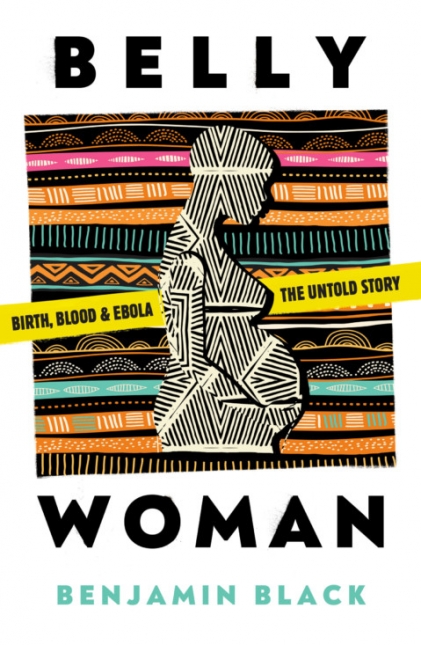Belly Woman: Birth, Blood & Ebola: The Untold Story
- By Benjamin Black
- Neem Tree Press
- 368 pp.
- Reviewed by Jay Hancock
- May 30, 2024
An unflinching look at a harrowing epidemic in Africa.

In certain African cultures, wrote John S. Mbiti in African Religions and Philosophy, the dead are a little less dead, still in the world of human caring, if somebody alive knew them and remembers them. By August 2014, Benjamin Black had treated hundreds of sick and dying patients in the worst known epidemic of Ebola virus disease. Working in Sierra Leone, sweating for hours a day in an impermeable suit, he felt the individuals in his care fading out of mind and remembrance.
To rehumanize himself and his patients, he brain-bookmarked two nameless boys whose parents had already died of Ebola. The boys came to the treatment center, suffered for a few days, and also died, first the elder, then the younger. Writes Black in Belly Woman:
“Before I closed his young eyes, I whispered that I would not forget him. The brothers had died within a day of one another. Now, years since that day, I see their faces.”
Black is a British obstetrician and gynecologist. He arrived in Sierra Leone to work for Médecins Sans Frontières (MSF) in June 2014, a few weeks after the country recorded its first Ebola cases in an outbreak that started in neighboring Guinea. Delivering babies in one of Africa’s poorest countries is hard enough without a virus that kills half of those it infects; one baby in 10 was dying before Ebola broke out. So were many mothers. (“Belly woman” means a pregnant woman in Krio, the local, English-derived lingua franca.)
Women got to the MSF base by ambulance over rough roads, in terrible distress, and often after days of contractions. Any notion that a maternity hospital could focus on births and not Ebola quickly disappeared. Obstetrics staff may have been more at risk than those in the Ebola hospitals because the virus spreads like HIV or hepatitis — via bodily fluids, not by breathing. Healthcare workers must avoid contact with the blood, vomit, and feces of suspected Ebola patients.
Doctors delivering babies, especially those performing emergency cesarean sections, have a very hard time doing this. A physician in the Ebola clinic told Black, “I would feel safer here” than in the maternity hospital.
Black is doubly brave — risking death to help people and then writing this heartbreakingly honest book. When it was all over, as Britain’s government handed out medals to Ebola heroes, a researcher asked him to summarize his feelings.
“Ashamed,” he said.
A natural response. Thousands of Africans died of Ebola. The rich world was late to help. In a place beggared of medical resources, where life-and-death decisions needed to be made in seconds with incomplete information, mistakes and moral compromises should’ve been in the job description.
At least three lives were on the line in every patient encounter in the maternity ward: mother, baby, and doctor. Who was more important? Laboring women would arrive with vaginal bleeding and broken membranes — common in pregnancy but also signatures of Ebola. Isolate them for a day or two to await Ebola test results, and you endanger both mother and child; women sometimes died of obstetrical complications while waiting. Treat them now and risk infecting yourself and your colleagues.
Complicating matters, rural Sierra Leoneans questioned whether Ebola was real and mistrusted outsiders ordering them around. Neither the national government nor Europeans had ever done them much good. Authorities urged people to inform on infected neighbors and banned ceremonial washing of the dead, “an incomprehensible dishonour for many,” Black writes, “perhaps worse than death itself.”
At the peak of the outbreak, Black and his colleagues closed the maternity unit as they worried both about the danger to themselves and (they told themselves) the risk that international aid would cease if medical workers started dying. Soon afterward, after a healthcare worker in another clinic contracted Ebola, Black took himself out of action and flew back to Europe.
Then he returned to Africa. Uncomfortable with his abrupt exit, and knowing people still needed help, “I could not not be there,” he explained to friends.
The book, which he calls “my public catharsis,” invites all kinds of criticism. Should Black have kept the maternity operation open? Should he have stayed? Was he playing the white savior to poor Africans? Should he have handled this case or that differently? Should he be writing so plainly about MSF’s imperfections? Belly Woman’s unsettling reportage of how medicine is really done would be hard to publish from a rich country with lawyers and compliance departments.
Black broaches these matters, and nobody could be harder on him than he is. But he was one of many good people doing their best in a very bad situation. Patients often survived, leaving the isolation tents to rejoin the living in celebration and gratitude. Saying goodbye to one recovered woman, “I took pleasure in shaking her hand, skin to skin,” he records.
Benjamin Black helped end the epidemic, saved countless lives, and now shows the faces of those who suffered and those who served. Everything else is a footnote on the moral ledger.
Jay Hancock writes about history and economics. His work has appeared in the Baltimore Sun, where he worked for many years, KFF Health News, the New York Times, the Washington Post, and many other publications. His free Substack newsletter is here.

